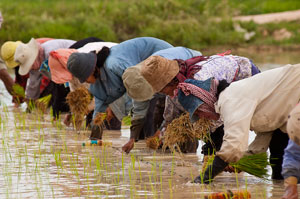With food prices continuing to increase across the globe there is an added focus by the global community on food security.
Australia is assisting vital agricultural research that will help with the development of climate resilient rice varieties–the staple food for almost half the world's population.
The International Rice Research Institute (IRRI) is the world's leading not for profit research organisation, working to help poor rice farmers improve the yield and quality of their rice in an environmentally sustainable way.
Australia has supported IRRI since its foundation 50 years ago, through contributions to fund infrastructure development, and continuing support for research programs to boost rice productivity and help poor farmers adapt to the challenges of a changing climate.
Climate change has the potential to impact on rice production in a number of ways; drought, submergence, salinity and heat stress. As an example, a small change in minimum overnight temperatures can lower rice yields by as much as 15 per cent.
Through a recent contribution of $15.4 million to IRRI, Australia is extending the capacity of that research by supporting the construction of a new state-of-the-art Plant Growth Centre and upgrades of IRRI's experimental farm. Each plays an important role for research into increased productivity and improved management practices to produce more rice for a growing global population against a backdrop of increasing pressures on production.
IRRI is a flagship centre of the Consultative Group for International Agricultural Research (CGIAR). In addition to the funding provided for the IRRI infrastructure upgrade, Australia is also doubling its funding for the CGIAR to $22 million a year by 2012-13. This funding is administered, on behalf of the Australian Government, by the Australian Centre for International Agricultural Research.
Food security a primary focus for the G20
Following the Seoul Declaration of 2010, food security continues as an important focus for the G20 and its Development Working Group.
The Organisation for Economic Co-operation and Development and the Food and Agriculture Organization alongside a range of international organisations have been tasked to research and provide recommendations on how to better mitigate and manage the risks associated with the price volatility of food and other agricultural commodities–without distorting market behaviour and ultimately protecting the most vulnerable.
Once those recommendations have been prepared, G20 countries will consider them in the context of the role that the G20 can most appropriately fulfil. Australia has suggested a focus on international principles for export restrictions, better market information, and managing risks of higher prices.
Funding to the CGIAR helps support strategic research programs, linking the expertise of a number of agricultural research centres. IRRI will lead the first of these programs–the Global Rice Science Partnership–to improve the productivity of rice among poor farming communities. This program links IRRI with the International Centre for Tropical Agriculture and AfricaRice.
Food security fast facts:
- The World Bank has estimated that over 44 million people in low and middle income countries across the globe will have fallen into extreme poverty as a result of price rises since June 2010.
- The World Bank also estimates that over 24 million food producers have escaped from poverty while approximately 68 million have fallen below the US$1.25 poverty line as a result of increased food prices. Half of the world's people living below this poverty line are smallhold farmers.
- Global food prices continued to rise in February 2011, up by 2.2 per cent from January, reaching record levels for the third consecutive month.
- In February the FAO Food Price Index rose five per cent higher than the peak experienced during the food price crisis in June 2008. This is the highest point reached since January 1990–the inception of the index.

